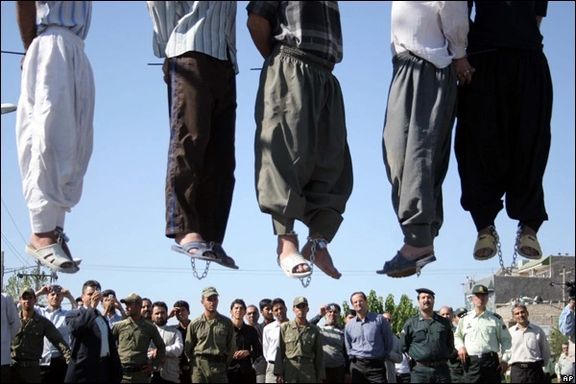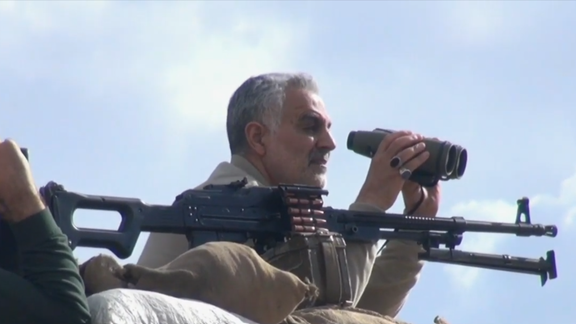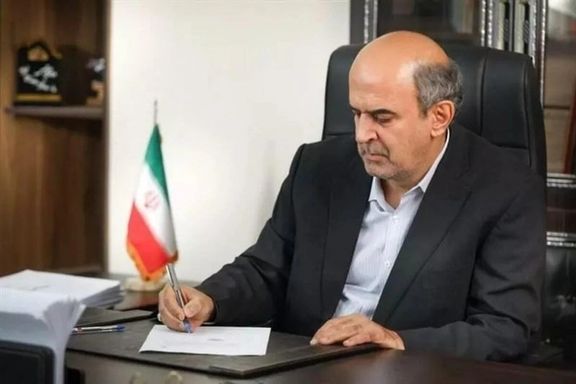Iran Human Rights Organization Warns About Escalating Executions

The Iran Human Rights Organization (IHRNGO) has issued a report sounding the alarm about the rising threat of more executions in Iran coinciding with the Christmas holidays.

The Iran Human Rights Organization (IHRNGO) has issued a report sounding the alarm about the rising threat of more executions in Iran coinciding with the Christmas holidays.
On Saturday, the organization based in Norway also reported that the execution of Samira Sabzian is expected to take place in the upcoming days. Initially scheduled for December 13, her execution for the alleged murder of her husband was deferred by a week. Samira, who was married as a child, has been on death row for a decade.
IHRNGO is calling on the public, civil society, and the international community to intervene and prevent the executions of Samira and other individuals on death row by engaging in anti-death penalty campaigns and political actions. Director Mahmood Amiry-Moghaddam expressed apprehension about the average of over four executions per day in the past week, stressing the need for the global community to speak out. He voiced concerns that, during the Christmas and New Year holidays, when many parts of the world are on vacation, more individuals may face the risk of execution.
“During this time, particularly individuals such as women, juvenile offenders, protesters, and political prisoners whose executions could elicit stronger reactions under normal circumstances are at greater risk.”
The Mizan news agency of Iran's notorious judiciary also announced the execution of an unnamed man on December 16 in Zahedan Central Prison, citing "links with foreign services, including Mossad." The timing of the execution, occurring a day after the armed attack on the Rask police headquarters, raises suspicions of it being retaliatory.
Iran Human Rights has documented a total of 31 executions between December 9 and December 16, 2023.

One of Iran’s cyber espionage tactics to support Hamas is using Hebrew-speaking women to gather intelligence from Israeli soldiers, Iran International has learned.
According to our sources, several of these women are based in the religious city of Mashhad in northeastern Iran and use social media to seduce Israeli soldiers by sending nude images or provocative footage of themselves in an effort to gather military intelligence.
While the screen names and details of these women are presumably fake, the explicit photos and videos they shared with Israeli soldiers appear to be genuine. To entice their victims, these cyber operatives sent photos and videos of themselves wearing revealing clothing, heavy makeup, and, in some cases, nude photos.
According to Iran International's investigations, members of this IRGC-run catfishing cell use a wide range of fake profiles across various online platforms, managing at least 22 different avatars in some instances.

Two of these Mashhad-based 'swallows', identified as Samira Baghbani Torshizi and Haniyeh Ghaffarian, used their real pictures but posed as Israeli soldiers in their attempt to seduce and extract information from real Israeli soldiers. Torshizi, whose screen name was “Or Olga,” had claimed to be a Jewish immigrant residing in London. She had asked a soldier if she could see pictures of a vehicle he used in the army, wondering if “it is secret or classified.”
Ghaffarian had also tried to make an emotional bond with an Israeli soldier through sending photos and videos of herself.
Last month, the IDF announced that it foiled a network of Hamas supporters using fake social media profiles to extract information from the IDF forces, including information on the units that would be sent into the Gaza Strip and the timing of dispatches or operations underway as part of the Israel’s offensive against Iran-backed Islamist militia Hamas.
The accounts made contact with troops and “managed a kind of romantic relationship… through correspondence, voice recordings and video calls” in order to gather information for Hamas, the IDF said. The number of potential victims was estimated to be between hundreds and thousands of soldiers, including reservists. The IDF said the faux social media profiles had additional fake profiles posing as relatives and friends, in order to “strengthen their credibility.”
"In one case, the operative asked for the name of the soldier’s base and inquired, 'When are you entering Gaza?' In another instance, a profile named 'Shira Simon' claimed to be an intelligence officer to an officer in the Givati brigade, subsequently asking why he was on a base in the Golan Heights. The soldier replied that he was there for training."
Last year, Israel's internal security service Shin Bet also revealed a similar case, an Iranian operator working under the name of Sara Puppi, pretending to be a young Jewish girl with connections and business in Israel. In February, Twitter and Facebook suspended pages and profiles of an Iranian disinformation unit that was targeting nationalist and ultra-religious Jews in Israel.
Sexpionage is a historically documented phenomenon and was one of the methods of choice for the Soviet intelligence. In the Soviet Union, female agents tasked with employing such tactics were called 'swallows,' while their male counterparts were referred to as 'ravens.' The Islamic Republic has famously used swallows to honeytrap or blackmail its critical figures.
In one of the major recent cases, Iran’s intelligence apparatus used one of these so-called swallows to lure and consequently abduct Habib Asyud (also known as Habib Chaab) -- an Iranian-Arab leading separatist – in Istanbul. He was smuggled to Tehran in November 2020 and was hanged earlier this year.
Iran supports Hamas but says it did not play any role in the Islamist militants' October 7 terror attack that triggered the current crisis. Iran also backs the Hezbollah, a Lebanese militant group that has deep ties with Hamas and Islamic Jihad, another Palestinian faction in Gaza that is also backed by Iran.

Iranian vice president for legal affairs announced that the regime has initiated the process of filing a complaint for the killing of former IRGC-Quds commander Qasem Soleimani.
Soleimani was assassinated in a US drone strike near Baghdad International Airport on January 3, 2020, under the order of then-President Donald Trump.
The official, Mohammad Dehghan stated, "In April, we will register our complaint against the US government. The US government has allowed the assassination to take place against international conventions, and Trump and other US officials who violated the conventions have not been prosecuted." He emphasized that figures like Soleimani are considered internationally protected, claiming he had been on a "diplomatic mission" in Iraq at the time of the assassination.
Soleimani was the Iranian regime's top military and intelligence operative in the Middle East, establishing proxy militant groups and overseeing Iran's military involvement in Syria.
Dehghan noted a preliminary step requiring six months to pass from the time of warning the United States, and April 2024, when the complaint will be registered in The Hague.
Iranian Foreign Minister Hossein Amir-Abdollahian had previously disclosed in January that nearly 60 US officials were blacklisted by Tehran for their involvement in Soleimani's assassination.
Iran's President Ebrahim Raisi and Supreme Leader Ali Khamenei have consistently vowed revenge for the killing of Soleimani. Since Soleimani's death, a member of the Iranian Revolutionary Guard has been charged with planning to assassinate former US National Security Advisor John Bolton and former Secretary of State Mike Pompeo as retaliation for the military commander's killing.

Some media outlets and commentators in Iran have argued that a recent $3.7 billion corruption case is only one case among tens of others, offering very high estimates.
In a report on Khabar Online website, Iranian academic Mohammad Hossein Gharib suggested that the largest corruption cases in Iran have occurred after 2005 when populist President Mahmoud Ahmadinejad first came to power. Ahmadinejad brought with him individuals, who quickly proved adept at using their government positions to get rich.
These cases include a $6 billion corruption case resulting from Iranian tycoon Babak Zanjani's efforts to help the government bypass international sanctions and sell Iran's oil in in the international markets. A $7.2 billion case at the Iranian Insurance Company, a $5.3 billion embezzlement case at the Iranian Teachers' Pension Fund, and a one-billion-dollar embezzlement case about financial irregularities in importing poultry feed. All of these occurred when the rate of exchange for US dollar was around 30,000 rials per dollar.
The most recent case, amounting to $3.7 billion, was even larger considering the exchange rate at the time was over 500,000 rials per dollar. The report attributed this corruption to a centralized government economy, attempts to circumvent sanctions, the government's granting of concessions to its loyalists, and the traditional practice of nepotism.

Former lawmaker Heshmatollah Falahatpisheh told local media on Saturday that at least $57 billion has been embezzled by government officials and operatives in the past two decades.
A report on Faraz daily website, investigated the role of former Agriculture Minister Javad Sadatinejad in the Debsh Tea corruption case, while describing the case as the tip of the iceberg of financial corruption in the government of President Ebrahim Raisi. However, the website added that Raisi has tried to blame the previous government under President Hassan Rouhani and the Iranian Judiciary for the case.
According to the report, Raisi claimed that his government had detected and stopped the embezzlement, leading to the firing of around 60 managers whose cases were sent to the Judiciary. However, Judiciary Chief Gholamhossein Mohseni-Ejei later contradicted this claim, stating that the government had not implicated anyone in the case.
The report also revealed that the Judiciary was the entity that initially exposed the corruption case, and Ejei disclosed that Sadatinejad had been forced to resign when signs of financial corruption became public. Ejei further revealed that despite ongoing corruption since 2019, additional funds were channelled to the Debsh Tea company by the government as recently as 2022, with Vice President Mokhber implicated in media reports as the facilitator. The report suggested that Mokhber may have tipped off Sadatinejad to resign.
Meanwhile, centrist Aftab News quoted Farshid Mohebbi, the managing director of the Union of Tea Planters in northern Iran as saying that the Iranian state TV pulled him off the air when he started to say that even the tea served at Iranian government offices is imported because the government does not wish to support domestic producers.
He revealed that Debsh Tea Company, mixed outdated Iranian tea with imported foreign tea and exported the blend to countries such as Tajikistan, Afghanistan and Russia although its officials knew that their product was carcinogenic.

A Revolutionary Court in Tehran has handed down an 11-year prison sentence to Sajjad Iman-Nejad, one of the detainees from last year's anti-government protests.
According to the Human Rights Activists News Agency (HRANA), Iman-Nejad faces charges of "armed confrontation" and "intentional assault on law enforcement officers with a cold weapon."
In addition to the prison term, the court has mandated restitution, requiring Iman-Nejad to pay over 50,000 USD to seven law enforcement officers. The court session addressing the charges against the political prisoner took place on November 20 but the verdict became public Sunday.
HRANA, citing an informed source close to Iman-Nejad's family, reported that there are seven complainants by alleged victims, with three of them stating that Iman-Nejad did not assault them. The source further highlighted Iman-Nejad's health challenges, stating, "He is suffering from a disc herniation and physical problems. Despite being transferred to the hospital multiple times for treatment during his detention, he was told there were no available beds. Despite his serious need for treatment, he was returned to prison."
He was arrested on October 8, 2022, in connection with the Iranian uprising against the regime in Tehran. Currently detained in Evin Prison, Iman-Nejad, born in 1991 in Ardabil and residing in Tehran, is single and holds a bachelor's degree in architecture.

Debris from a downed drone killed a civilian in the Odesa region after Ukraine's air force said it had destroyed 20 drones that Russia launched overnight.
Air defense systems destroyed nine Iran-made attack drones over Odesa, the region’s Governor Oleh Kiper said on the Telegram messaging app, calling it the third Russian air assault on the region in the past week.
Russia has been launching swarms of Iranian drones against infrastructure and civilian targets in Ukraine since October 2022. The drones are also used during missile attacks to overwhelm Ukrainian air defenses. Western countries have sanctioned dozens of individuals and entities involved in the supply of the kamikaze weapons.
"However, one of the downed drones fell into a residential area in Odesa district and exploded," Kiper said, adding that several houses were damaged, and one person was found dead in one of them afterwards.
The air force said its defense systems destroyed a cruise missile in addition to the drones. It said, without providing details, that Russia also launched an Iskander ballistic missile that "did not reach" its target.
The Russian air weapons were destroyed over Odesa, Kherson, Zaporizhzhia and Khmelnitskyi regions, the air force said.
On Saturday, the southern Ukrainian city of Kherson was hit by Russian drone attacks, local authorities reported.
The regional military administration said that one doctor was injured when the debris from a shot down an Iranian Shahed drone rained down on the hospital building in the port city.
Ukraine’s Operational Command South reported that it shot down nine Iranian-made Russian-operated drones over the Kherson region.
With reporting by Reuters, AP